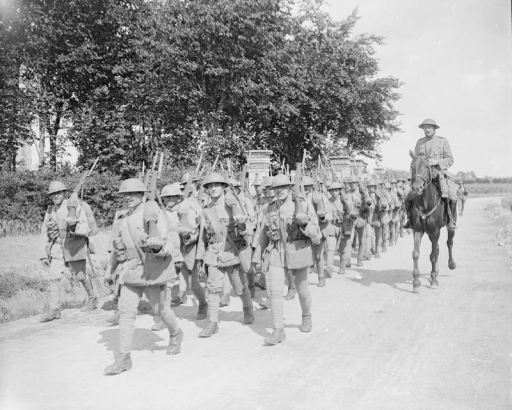The President of Portugal’s First World War Centenary Commission, Lieutenant-General Mário de Oliveira Cardoso, has spoken to Centenary News about his country’s plans to mark the Centenary.
He identified preserving the “collective memory” of the conflict for young people today and for future generations as a key aim of Portugal’s Centenary plans.
“It is important to remind people of the hardships the Portuguese people went through and to honour the memory of those who fought and served, all of whom made sacrifices to defend what were perceived to be the country’s vital interests”.
He said that one of the most important reasons to educate people about the First World War “originates from the sense that the problems that led to the Great War are still unsettled and need clarification. This clarification is a crucial step for us to be able to try and understand why Europe and the world are the way they are today”.
 The official logo of Portugal’s First World War Centenary Commission
The official logo of Portugal’s First World War Centenary Commission
Portugal entered the First World War on the side of the Allies in 1916. Although Britain (as England) and Portugal have the oldest alliance in history (enacted in 1386 by the Treaty of Windsor and maintained by NATO membership today), Portugal initially remained neutral.
However, German and Portuguese forces had been involved in skirmishes in Africa from 1914 up until the official declaration of war by Germany on Portugal on the 9th March 1916.
The declaration came after Portugal agreed to a British request to intern Austro-Hungarian and German ships docked in Lisbon.
Portuguese forces fought in Europe as well as in Africa. The Battle of La Lys, which began on the 9th April 1918, saw huge losses for Portugal as the Germans broke through their lines on the Western Front.
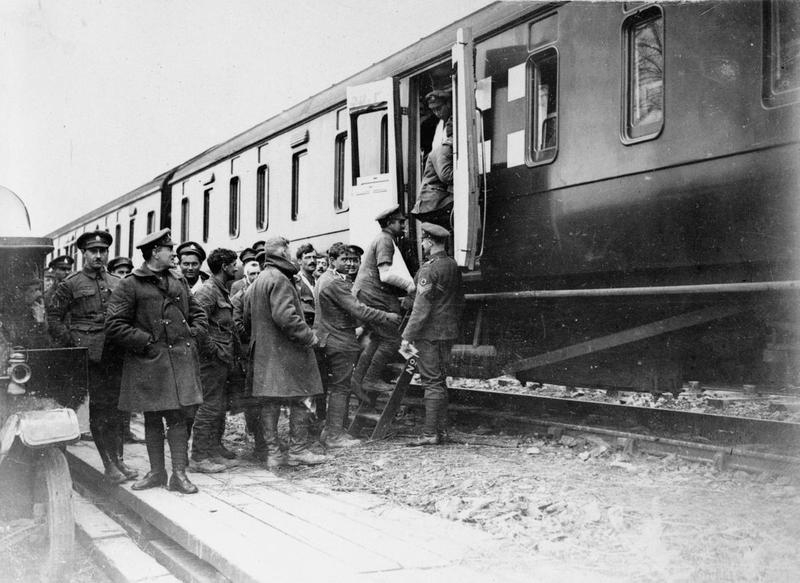 ‘Battle of the Lys: Wounded British and Portuguese troops entering a hospital train at Hinges’, courtesy of the Imperial War Museum, © IWM, Q 345
‘Battle of the Lys: Wounded British and Portuguese troops entering a hospital train at Hinges’, courtesy of the Imperial War Museum, © IWM, Q 345
Centenary plans
The Commission is focusing on cultural and research projects with ‘Portugal and the Great War’ as the overarching theme.
Lieutenant-General de Oliveira Cardoso stressed to Centenary News that terms such as “commemoration” and “celebration” were being avoided. The emphasis is instead being placed on the sacrifices made not only by soldiers, but by the Portuguese nation.
The country’s Military Academy, as well as universities and colleges, are involved in the production of exhibitions, seminars and conferences over the period of 2014-18.
October 2014 will see a ‘National Tribute to the Portuguese War Effort’, described by Lieutenant-General de Oliveira Cardoso as a “high point” in national plans to commemorate the conflict.
A formal sitting in the Assembly of the Republic (the Portuguese parliament) on the 7th October will see members discuss the First World War and the importance of the Centenary. This will be followed on the 18th of October with ceremonies at more than one hundred memorials across Portugal, paying homage to soldiers who fought in the First World War.
Military units in the Portuguese armed forces will also play an active role in the Centenary by taking part in ceremonies and research projects.
Histories of the units which fought during the First World War will be researched and exhibited as part of efforts to commemorate soldiers at a local level.
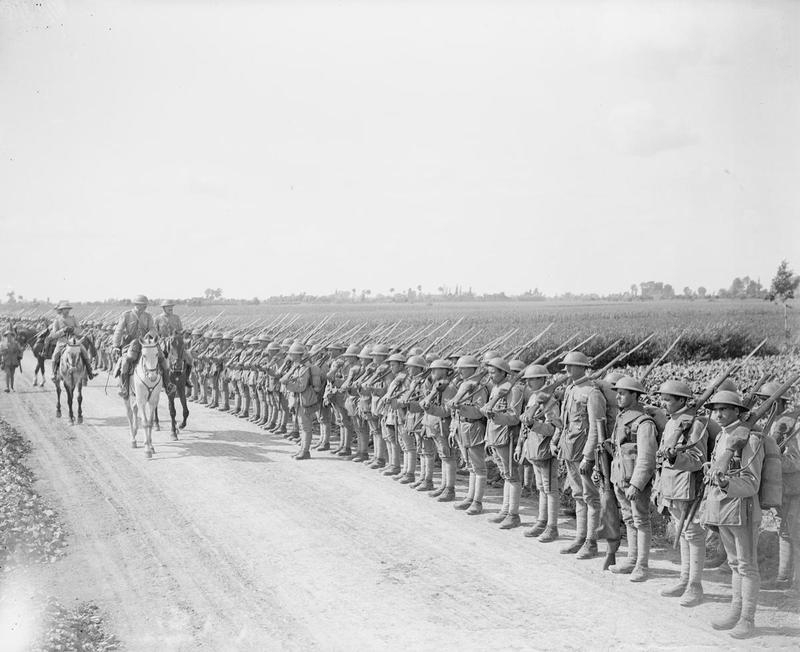 ‘Portuguese infantry drawn up on the roadside for inspection. Locon, 24 June 1917′, courtesy of the Imperial War Museum, © IWM, Q 5536
‘Portuguese infantry drawn up on the roadside for inspection. Locon, 24 June 1917′, courtesy of the Imperial War Museum, © IWM, Q 5536
The Centenary of the formal declaration of war on Portugal will be marked in 2016 with a television series exploring Portugal’s participation in the conflict.
The Centenary Commission is also in the process of developing an exhibition for 2016 which will document the social, cultural and political circumstances surrounding Portugal’s entry into the war, as well as the experiences of men on the front line.
Lieutenant-General de Oliveira Cardoso told Centenary News that it was “important to attempt to portray the everyday life of a Portuguese soldier during the Great War as realistically as possible, in the various theatres of combat in which we fought”.
The 100th anniversary of the Battle of La Lys, where thousands of Portuguese troops were killed, wounded and captured by German forces in April 1918, is expected to be a focal point for commemorations in 2018. The date is already marked annually with ceremonies in Portugal and in French cemeteries where Portuguese war-dead lie.
Africa
Lieutenant-General de Oliveira Cardoso stated that the African theatre of the conflict warrants “special attention” during the Centenary period.
Portugal’s former African colonies, namely Angola and Mozambique, witnessed fighting between German and Portuguese forces before any official declaration of war.
As a result, children from these countries who study in Portugal will be invited to “actively participate in all Centenary cultural events”.
“At present, it is being assessed how these events will be organised, so as to allow the most appropriate means for us to pay tribute to those who fought and died”.
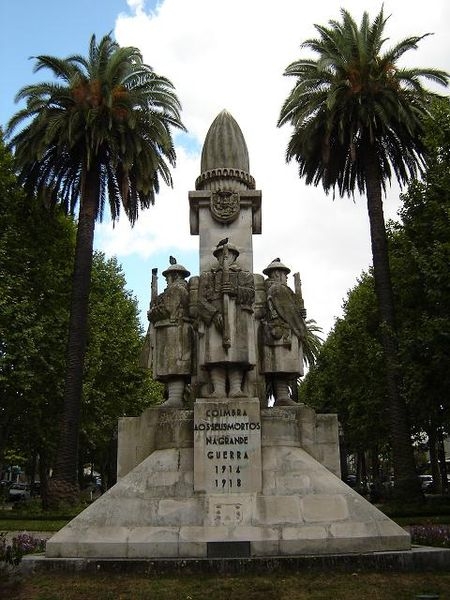 Monument to the Portuguese soldiers who died in the First World War in Coimbra, Portugal
Monument to the Portuguese soldiers who died in the First World War in Coimbra, Portugal
During the period of 1914-16, approximately 27,000 Portuguese soldiers were sent to Africa (9,000 to Angola and 18,000 to Mozambique). A significant number of African soldiers loyal to Portugal also took part in the fighting in these countries, but none were sent to fight in Europe.
Speaking of the “shared sacrifice” made by Portugal and its former colonies, Lieutenant-General de Oliveira Cardoso highlighted that memorials erected in memory of the First World War in Portugal were dedicated to “European and African soldiers”.
Challenges
Lieutenant-General de Oliveira Cardoso acknowledged the challenges which come with his position in terms of engaging with the general public:
“At a grassroots level, the First World War is not a topic which interests the Portuguese people at large.
“In the context of the social and economic difficulties the country is going through, the Centenary is not necessarily at the forefront of people’s minds”.
As a result, it is important, the Lieutenant-General said, that there is a concerted effort to explain why Portugal went to war and how the legacy of the conflict remains with the country to this day.
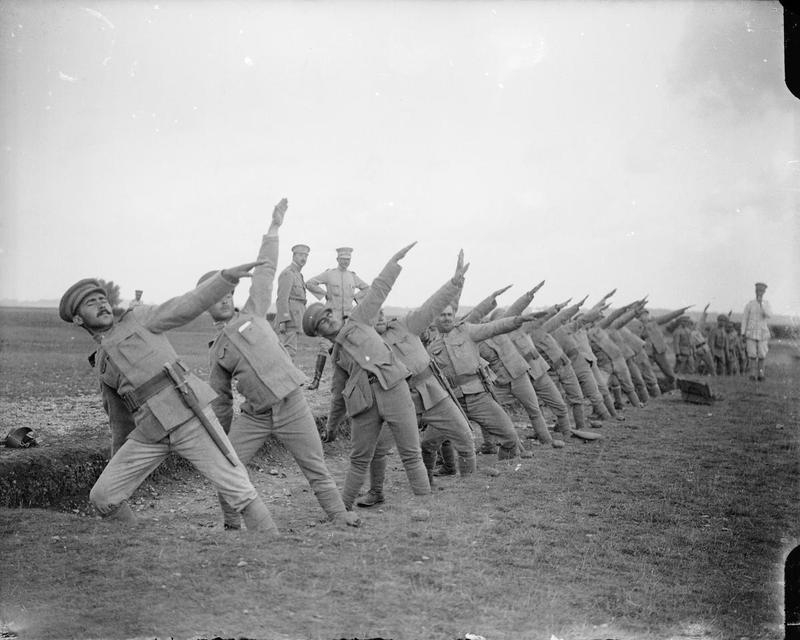 ‘Portuguese troops at grenade throwing practice at the Infantry Training School. Marthes, 23 June 1917’, courtesy of the Imperial War Museum, © IWM, Q 5557
‘Portuguese troops at grenade throwing practice at the Infantry Training School. Marthes, 23 June 1917’, courtesy of the Imperial War Museum, © IWM, Q 5557
This is being addressed to a degree already by the academic community, where a number of seminars and conferences about Portugal during the First World War have already taken place in light of the Centenary.
Other factors, including Portugal’s colonial wars in India and particularly Africa from 1961-74, the Lieutenant- General points out, have “severely affected Portuguese society” and are remembered more vividly today.
With commemorations of the 50th anniversary of these conflicts having been held in 2011, there are far more tangible links for young people today – many who will have fathers and grandfathers who fought – to these colonial wars than with the First World War.
Being so recent, Portugal’s colonial wars “somehow cast a shadow over our older memories”.
The Lieutenant-General was optimistic however that the Centenary will provide an opportunity for the Portuguese people to learn about the First World War, particularly as a large number of educational institutions will be invited to take part in commemorations, alongside local communities.
The Liga Dos Combatentes (League of Combatants) – which was established after the First World War to support Portugal’s veterans – is also expected to take an active role in the Centenary, as it already marks the anniversary of the Battle of La Lys every year.
Lieutenant-General Mário de Oliveira Cardoso emphasised that the Centenary of the First World War was an opportunity for all sections of Portuguese society to learn about a crucial part of their country’s history. The 100th anniversary of the Battle of La Lys in 2018 in particular will be a focal point for commemorations at local and national levels, with plans for exhibitions, seminars and cultural events expected to be announced in the coming years.
Centenary News will continue to report on Portuguese efforts to mark the Centenary of the First World War over the coming months.
© Centenary Digital Ltd & Author
